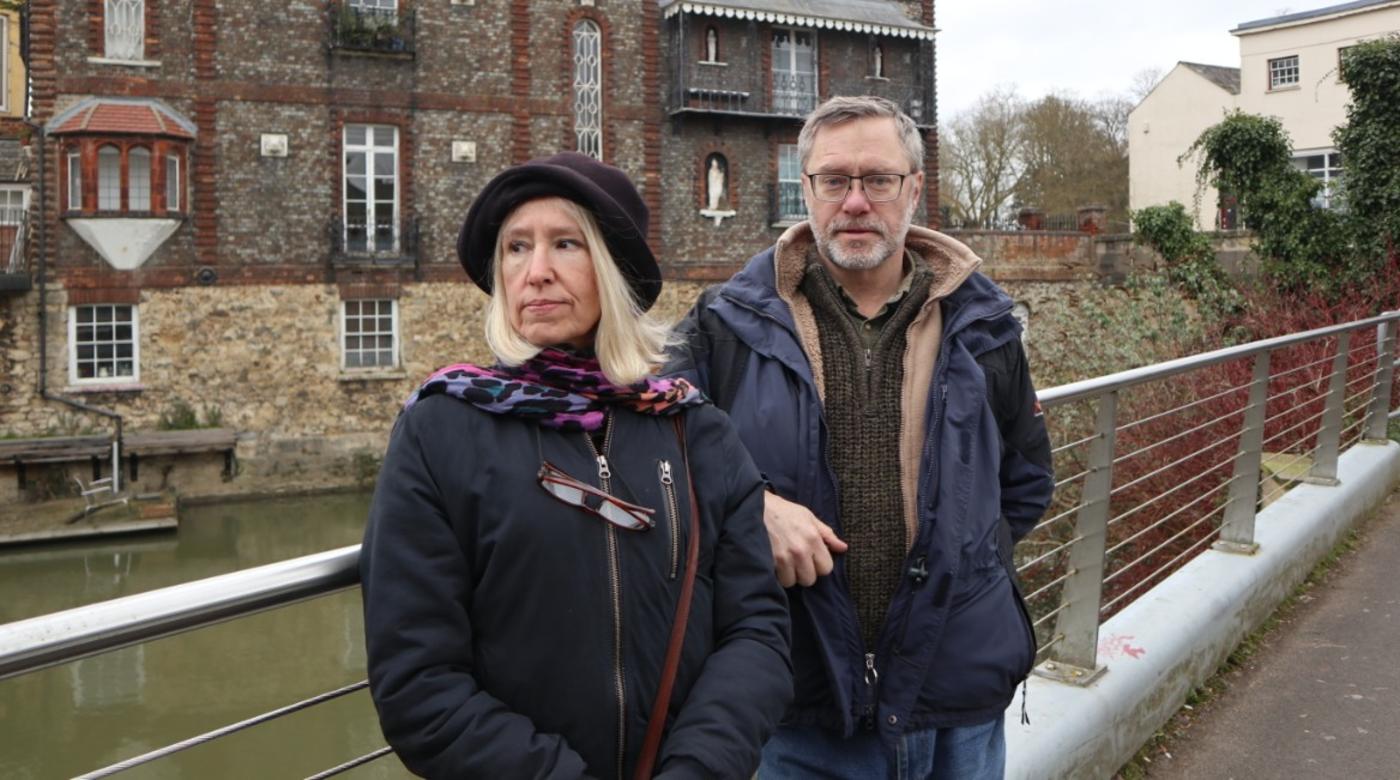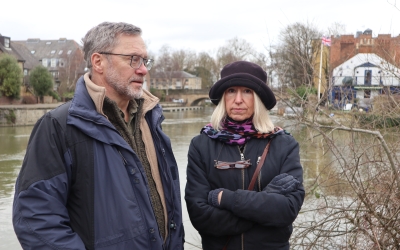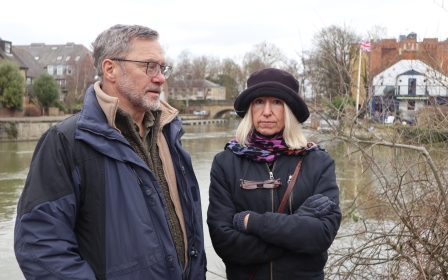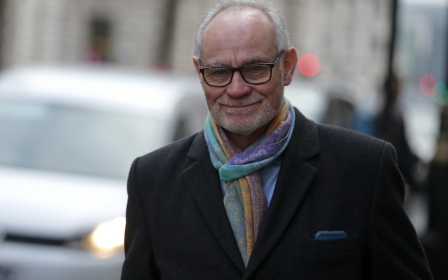REVEALED: How British police used Prevent to spy on Jack Letts’ parents

British counterterrorism police used a Prevent officer and a Home Office-funded organisation to gather intelligence from the parents of a British man under investigation for travelling to Syria, Middle East Eye can reveal.
The target of the investigation was Jack Letts, a Muslim convert from Oxford who travelled to Islamic State-controlled areas of Syria and Iraq aged 18 in 2014.
Investigators assigned a Prevent liaison officer to monitor and report on Sally Lane and John Letts’ contact with their son at a time when they were seeking police permission to send him money to help him escape from IS-controlled territory.
Lane and Letts had already been warned by police for sending £233 ($303) to a Syrian man in Lebanon at their son's request in September 2015.
The operation also involved police collecting intelligence from the Active Change Foundation, a Prevent-backed counter-extremism organisation based in east London, to which the couple had been “signposted” for support and advice in November 2015.
New MEE newsletter: Jerusalem Dispatch
Sign up to get the latest insights and analysis on Israel-Palestine, alongside Turkey Unpacked and other MEE newsletters
Within weeks of the Prevent officer’s deployment, Lane and Letts, 57 and 59, had themselves been arrested for trying to send money, despite having been told days earlier by the assigned officer that they had permission from the police to do so.
Police subsequently retracted that permission, and acknowledged after the couple had been arrested that they had been given “misleading advice”.
Middle East Eye is on Friday publishing the results of a months-long investigation into the case based on interviews with many of those involved and access to documents disclosed during the course of the couple's trial on terrorism charges, including transcripts of police interviews, emails and phone records and messages between Jack Letts and his parents.
The investigation is likely to raise fresh concerns about the government’s Prevent strategy, which is directed at people considered to be vulnerable to being drawn into terrorism.
While Prevent’s advocates argue that it is a form of safeguarding, critics say it is used to gather intelligence on those who cross its radar and may even be counter-productive.
Lane told MEE that the couple had felt “utterly betrayed” by police and others involved in the case who they believed wanted to help them to save their son from danger.
“It’s taken me 57 years to become a radical,” said Lane. “That’s what this experience has done to me. I was very middle of the road but now I see the world completely differently.”
Our story reveals how Lane and Letts believed Hanif Qadir, the head of the Active Change Foundation, could draw on his alleged connections with British intelligence to help facilitate Jack Letts’ escape from IS.
What is the Prevent Strategy?
+ Show - HidePrevent is a programme within the British government's counter-terrorism strategy that aims to “safeguard and support those vulnerable to radicalisation, to stop them from becoming terrorists or supporting terrorism”.
It was publicly launched in the aftermath of the 2005 London bombings and was initially targeted squarely at Muslim communities, prompting continuing complaints of discrimination and concerns that the programme was being used to collect intelligence.
In 2011, Prevent's remit was expanded to cover all forms of extremism, defined by the government as “vocal or active opposition to fundamental British values, including democracy, the rule of law, individual liberty and mutual respect and tolerance of different faiths and beliefs.”
In 2015, the government introduced the Prevent Duty which requires public sector workers including doctors, teachers and even nursery staff to have “due regard to the need to prevent people being drawn into terrorism”.
A key element of Prevent is Channel, a programme that offers mentoring and support to people assessed to be at risk of becoming terrorists. Prevent referrals of some young children have proved contentious. 114 children under the age of 15 received Channel support in 2017/18.
Criticism of the Prevent Duty includes that it has had a “chilling effect” on free speech in classrooms and universities, and that it has turned public sector workers into informers who are expected to monitor pupils and patients for “signs of radicalisation”. Some critics have said that it may even be counter-productive.
Advocates argue that it is a form of safeguarding that has been effective in identifying and helping troubled individuals. They point to a growing number of far-right referrals as evidence that it is not discriminatory against Muslims.
In January 2019 the government bowed to pressure and announced that it would commission an independent review of Prevent. This was supposed to be completed by August 2020. After being forced to drop its first appointed reviewer, Lord Carlile, over his past advocacy for Prevent, it conceded that the review would be delayed.
In January 2021 it named William Shawcross as reviewer. Shawcross's appointment was also contentious and prompted many organisations to boycott the review. Further delays followed. Shawcross's review, calling for a renewed focus within Prevent on "the Islamist threat", was finally published in February 2023 - and immediately denounced by critics.
Qadir told MEE that the couple had exaggerated the extent of those connections. But he said that ACF did have contacts with intelligence and security officials, and said that the organisation had operated in a "grey area" because of the sensitivities surrounding these issues.
Qadir said ACF, which had been promoted by the Home Office for its Prevent work, had lost its government funding as a consequence of the controversy surrounding the case, with officials telling him that the organisation was taking too many risks.
ACF, which was once praised by US President Barack Obama for an anti-IS social media campaign, lost its funding in 2016 and closed down in 2018.
Sally Lane and John Letts were last year found guilty of one charge of funding terrorism relating to the payment of £233 sent to Lebanon in September 2015.
But they were cleared of two subsequent charges over attempts to send money in December 2015 and January 2016, with lawyers for the couple arguing that they had acted out of duress because they believed their son’s life was in danger.
Jack Letts is currently being held alongside suspected IS members by Kurdish forces in north-eastern Syria. Like many other British dual nationals in Syria, he has been stripped of his British citizenship because the family are also Canadian nationals.
Lane and Letts now hope to travel to Canada to raise awareness about his case. John Letts told MEE that the couple had not heard from their son since receiving a letter via the International Red Cross last August.
“We have had no proof of life since October,” he said. “We are waiting for either bad news or a Red Cross letter.”
Letts also revealed that the couple had been unable to access confidential mental healthcare treatment as a consequence of their terrorism conviction.
Psychiatrists had advised them, he said, that they might be required to pass on information to the police as a consequence of the Prevent Duty, which requires public sector workers including doctors to monitor and identify people deemed to be vulnerable to being drawn into terrorism.
“We are in one of the most stressful situations anybody can go through and we cannot get confidential psychological support,” said Letts. “We are on our own, just the two of us, and there is so much stress.”
Counter Terrorism Policing South East told MEE it was not appropriate to comment on an ongoing investigation, and said Sally Lane and John Letts had been warned by detectives about sending money.
"CTPSE has always maintained that we do not consider John Letts and Sally Lane to be terrorists and there is no suggestion that they supported the ideology or actions of Daesh [the Islamic State group] in any way.
"However, they consciously chose to send money to their son despite knowing or suspecting that it might be used by him to support terrorist activity or it may fall into the hands of others who may use it for that purpose," it said.
A Home Office spokesperson told MEE that Prevent was working and was making a significant impact in preventing people being drawn into terrorism.
The spokesperson said there was nothing in law, or in guidance or training, that requires, authorises or encourages any form of spying in connection with the Prevent duty.
Middle East Eye delivers independent and unrivalled coverage and analysis of the Middle East, North Africa and beyond. To learn more about republishing this content and the associated fees, please fill out this form. More about MEE can be found here.






